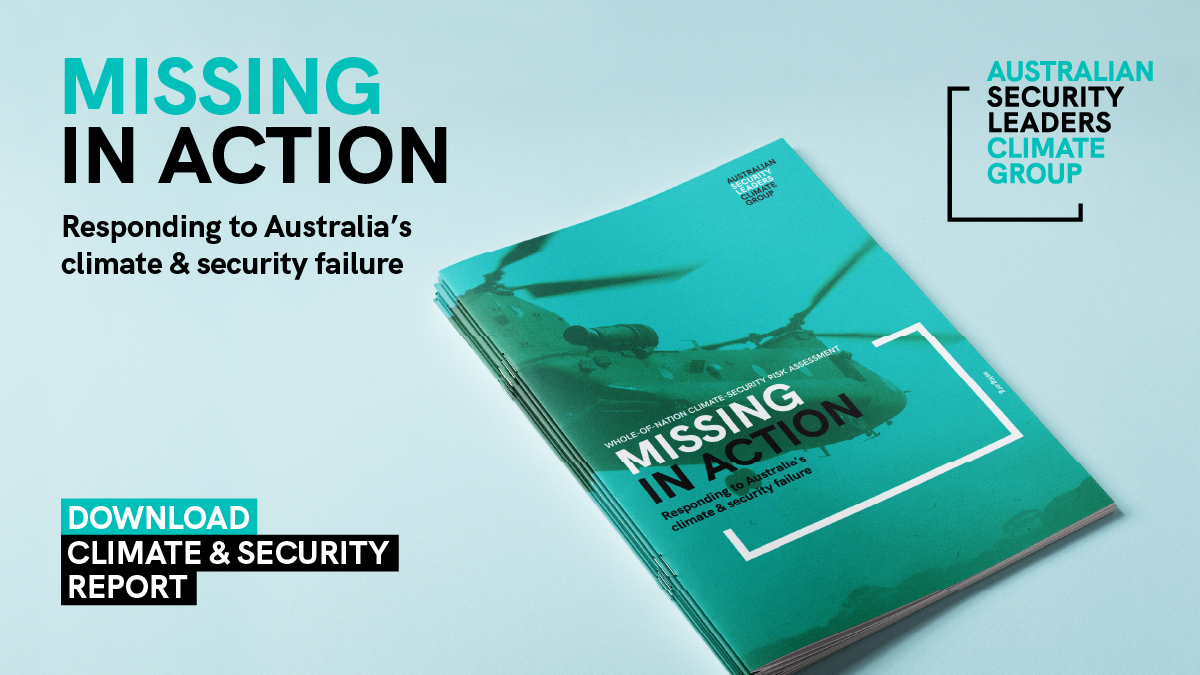
The first priority of any government should be to safeguard the people it serves and provide for their future well-being, their safety and security. In recent times, national security discussions in Australia have been focused almost exclusively on issues such as terrorism, migration, cyber and energy security, and largely in a policing and defence framework. However, security today must be understood in a broader societal context: national security is about human security.
As a result of three decades of political inaction on both sides of politics, climate change now represents the greatest, potentially existential, threat to Australian and global human security. New climate extremes confront us: record-breaking droughts and floods, extreme heatwaves, unstoppable bushfires, damaged infrastructure, and coastal inundation. And, as the latest report from the Intergovernmental Panel on Climate Change (IPCC) recently concluded, the worst is yet to come.
In vulnerable countries, governments have already collapsed and civil wars erupted, displacing millions of people looking for a safe haven. Instability is on the march and a growing insecurity shadows our daily lives and the relations between nations.
The impact of climate change on the health and well-being of peoples and nations starts with one element above all others: water and the ability to grow food.
In 2010, almost 2.4 billion people were living in areas with chronic water shortage, with around 800 million people living with extreme water shortage. Today, approximately 1.8 billion people lack access to safe drinking water and nearly 2 billion people lack access to sanitation. By 2035, more than 30 countries will experience extremely high water stress, inevitably increasing economic, social, and political tensions, particularly in our region. By 2030, population growth and a burgeoning global middle class will result in a worldwide demand for 35% more food and 50% more energy, compared to 2014.
In contrast, scientists project the subtropical zone will experience a 5–10% reduction in precipitation for each 1oC of global warming. At 3°C of warming, water availability will decrease sharply in the dry tropics and subtropics, affecting about 2 billion people, with agriculture becoming nonviable in many of these areas.
Recent analysis of the impact of extreme heat from climate change suggests that over the coming fifty years, between one and three billion people may be left in areas unsuitable for habitation, leading to increased levels of forced migration.
Responding effectively to these impacts will require unprecedented international co-operation, and a complete re-think of global refugee governance, rather than the nationalistic and militarised responses we have today.
Preparing for the growing climate threat is essential for our survival as a nation – unlike the pandemic, we will not be able to quarantine from these new climate extremes. However, because of a failure of political leadership, Australia is ill-prepared to handle the growing climate security impacts in our region; the highest-risk region in the world.
Australians are falling behind peer nations when it comes to addressing the impacts of climate change. We are failing in our responsibilities, both as a global citizen, to each other, and to future generations.
The Australian Security Leaders Climate Group (ASLCG) was formed earlier this year by leaders with a depth of career experience in defence, national security, policy and risk assessment, who are concerned about our lack of preparedness. For years, we have experienced firsthand the impact climate change is having in theatres of operation around the world, and the increasing calls for humanitarian assistance and disaster relief.
A particular concern is that our first responders, along with the Australian Defence Force (ADF), are already under pressure, as we saw in the 2019/20 bushfires. Higher levels of warming, which according to our climate scientists are now inevitable, will exceed our first responders’ capacity to respond.
Many Australians have repeatedly made representations to government about these concerns. These have been largely ignored. Just as the recommendations from the 2018 Senate Inquiry into the “Implications of climate change for Australia’s national security” were ignored.
Our assessment of successive Australian governments’ leadership failure, and the implications of its lack of preparedness to face global warming’s consequences, is set out in our new report: “MISSING IN ACTION – responding to Australia’s climate and security failure.”
We need to act on climate-related security risks, starting with a plan to Protect, Prevent and Prepare the community for what is ahead.
Air Vice-Marshal John Blackburn AO (Retd) is a former Deputy Chief of the Royal Australian Air Force. He is currently the Chair of the Institute for Integrated Economic Research-Australia.
Ian Dunlop is a Member of the Club of Rome. He was formerly chair of the Australian Coal Association and CEO of the Australian Institute of Company Directors.
John and Ian are both Executive Committee members of ASLCG.
This article was published in Pearls & Irritations on 7th September 2021
